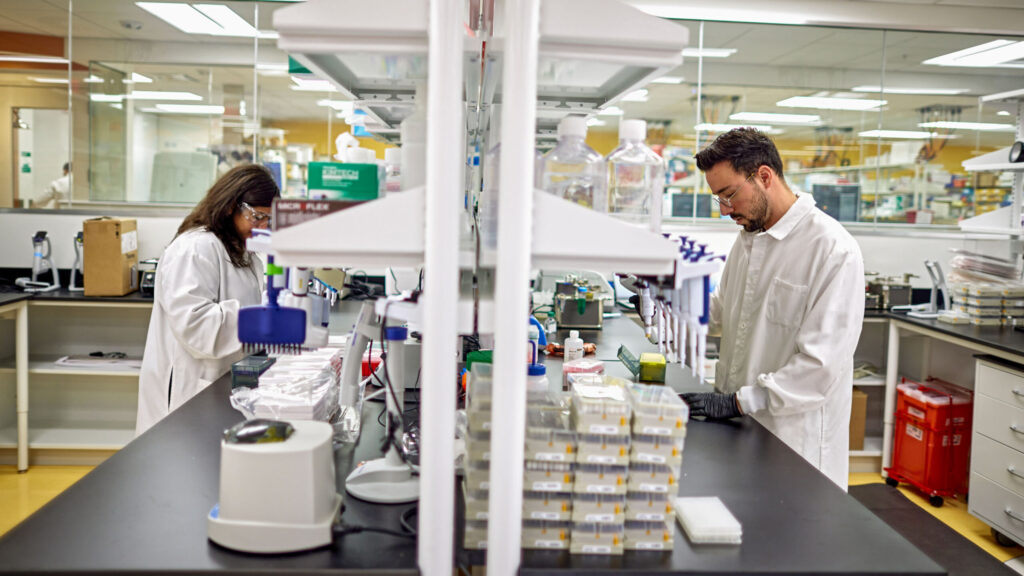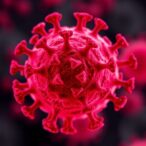AbbVie has agreed to acquire Gilgamesh Pharmaceuticals’ lead pipeline asset bretisilocin, a clinical-stage candidate designed to treat moderate-to-severe major depressive disorder (MDD), for up to $1.2 billion—a deal that, according to one analyst, reflects growing interest in psychedelic drugs by biopharma giants.
Bretisilocin, also called GM-2505, is a 5-HT2A receptor agonist and 5-HT releaser for which Gilgamesh in May announced positive topline results from a Phase IIa trial (NCT06236880) showing clinically impactful and statistically significant reduction in severity of depressive symptoms versus low-dose active comparator, as measured by the Montgomery-Åsberg Depression Rating Scale (MADRS) total score.
At Day 14, a single 10 mg of bretisilocin demonstrated strong antidepressant effect with a -21.6 point change from baseline in MADRS total score vs. a -12.1 point change from baseline for the 1 mg low-dose active comparator, with no serious adverse events, Gilgamesh reported on May 27.
To date, according to Gilgamesh, bretisilocin has been shown to exert a shorter duration of psychoactive experience than previous-generation psychedelic compounds while retaining an extended therapeutic benefit.

“This acquisition underscores our commitment to broadening and enhancing psychiatric care by investing in novel treatment approaches with the potential to reach patients for whom other treatments have been ineffective. We look forward to advancing bretisilocin to late-stage clinical development,” Roopal Thakkar, MD, AbbVie executive vice president, research and development, and chief scientific officer, said in a statement. “The field of psychiatry represents one of the most challenging areas in medicine, with a significant need for innovative solutions.”
Challenging enough to have scared off numerous biopharma giants until recently, Sumant Kulkarni, a Canaccord Genuity senior analyst covering biotechnology with a focus on neuroscience, wrote in a research note.
That may explain why AbbVie shares on Monday dipped 1.45% on news of the acquisition, to $207.55 from $210.60 at the close of trading Friday. Gilgamesh is privately held. AbbVie shares inched up 0.4% Tuesday, closing at $208.36.
AbbVie’s announcement of its purchase of bretisilocin comes about a month after Bloomberg News reported that the biopharma giant was in talks to acquire Gilgamesh itself for approximately $1 billion, based on unnamed sources. At the time, Kulkarni wrote that such a deal “would represent a clear validation of mental health treatment approaches involving psychedelics by a major biopharma company.”
Shattering taboo
“[Monday’s] confirmation takes this a couple of steps further in our view,” Kulkarni followed up. He cited AbbVie’s plan to spend more than a billion dollars for a single pipeline candidate, and the fact that AbbVie’s announcement specifically used the term psychedelic, “which until now had been treated as taboo by major biopharma companies.”
“We consider this somewhat ironic as initial chemical syntheses of several such compounds happened in major biopharma labs several decades ago,” Kulkarni commented.
Kulkarni now foresees the stocks of five psychedelic drug developers covered by Canaccord Genuity to benefit from the AbbVie-Gilgamesh deal, since all have candidates that are farther along in development than bretisilocin:
- Atai Life Sciences—Atai is acquiring Beckley Psytech, whose treatment-resistant depression candidate BPL-003 (intranasal mebufotenin or 5-MeO-DMT) has generated solid Phase IIb data, with the combined company expected to seek FDA guidance to design a Phase III program for the drug.
- Compass Pathways—Compass’ COMP360 (psilocybin) has generated what Kulkarni called “very promising” Phase III topline data in TRD. He acknowledged the challenge of COMP360 involving 6 to 8 hours of treatment time but noted that later-stage durability data “could hold the key to eventual real-world usage.”
- Cybin—Cybin’s CYB004 (deuterated psilocin analog), a Phase III candidate, is being developed as an adjunct treatment for MDD and thus could emerge as a wild card, according to Kulkarni. CYB004 has shown positive Phase II data, but based on a study with fewer patients than the Phase II studies of several other psych drug developers.
- GH Research—Its lead candidate, an inhaled formulation of mebufotenin called GH001, has shown robust Phase IIb results in TRD, but the company remains under an FDA clinical hold that has stopped it from including U.S. sites in a planned Phase III program for the candidate. GH expects to start a pivotal program for TRD in 2026 and is also developing an intravenous formulation of mebufotenin called GH002.
- Mind Medicine (MindMed)—Lead candidate MM120, an orally disintegrating tablet (ODT) incorporating Catalent’s Zydis®fast-dissolve technology, is a pharmaceutically optimized form of lysergide D-tartrate (LSD) that is in Phase III trials for generalized anxiety disorder (GAD) and MDD after generating positive Phase II data.
All five companies showed stock price gains Tuesday. Compass showed the biggest increase (nearly 4%, to $4.76), followed by Cybin (up about 3% to $7.45), then Atai (up 1.9% to $4.83), GH (up 1.6% to $13.39), and MindMed (up 1.4% to $9.99).
The psychedelic drug market is projected to grow from $3.63 billion in 2024 to $10.11 billion by 2032, growing at a compound annual growth rate of 13.68% from 2025 to 2032, according to a report released August 12 by SNS Insider.
Going “wild on health”

Stocks of psychedelic drug developers rose last November after President Donald Trump nominated a vocal advocate for psychedelic drug development, Robert F. Kennedy Jr., as Secretary of Health and Human Services (HHS). Weeks before his nomination, Kennedy included “aggressive suppression of psychedelics” as an example of what he termed the FDA’s “war on public health” in a post on X.
A more favorable public stance on psychedelic drug development was among the ways Kennedy was expected to fulfill Trump’s desire to “go wild on health” through convulsive changes in regulatory policy and policymaking—one of “Seven Biopharma Trends to Watch in 2025,” as identified by GEN.
On June 24, Kennedy went further, telling the Health Subcommittee of the U.S. House of Representatives Committee on Energy & Commerce he believed there were 11 clinical trials in progress, particularly for retired service members.
“These are people who badly need some kind of therapy. Nothing else is working for them,” Kennedy told the subcommittee. “This line of therapeutics has tremendous advantage if given in a clinical setting, and we are working very hard to make sure that happens within 12 months.”
“It is critically important that we make sure that the science on this is solid and that preliminary results are very encouraging,” Kennedy cautioned, before adding: “We don’t want to wait two years to get this done.”
Washington’s embrace of psychedelic drugs under Kennedy and Trump contrasts with last year, when the FDA issued a complete response letter rejecting Lykos Therapeutics’ new drug application (NDA) for midomafetamine capsules to treat post-traumatic stress disorder (PTSD) in adults.
While members of Congress from both parties had called for approval of midomafetamine, the FDA sided with an advisory committee whose members questioned whether Lykos’ clinical data sufficiently showed durability, and whether clinical trial participants had expectancy bias due to prior MDMA use. Lykos’ then-CEO Amy Emerson resigned (she joined Lykos’ board in June), and the company has since agreed to conduct an additional Phase III trial.
Upfront, milestones, and a spinoff
AbbVie agreed to acquire bretisilocin for up to $1.2 billion, including an upfront payment and payments tied to achieving development milestones, all undisclosed. As part of the deal, Gilgamesh will spin off a new entity—to be called Gilgamesh Pharma—that will include its employees and other pipeline programs, including its oral NMDA receptor antagonist blixeprodil (GM-1020), which is completing a Phase IIa study in MDD; a cardio-safe ibogaine analog; an M1/M4 agonist; and the existing collaboration with AbbVie from which bretisilocin emerged.
The acquisition of bretisilocin comes less than a year after AbbVie’s neuro pipeline suffered a high-profile setback when emraclidine failed the Phase II EMPOWER-1 (NCT05227690) and EMPOWER-2 (NCT05227703) trials by missing their primary endpoint of showing statistically significant reduction in the change from baseline in the Positive and Negative Syndrome Scale (PANSS) total score vs. placebo at week 6. AbbVie acquired emraclidine when it bought Cerevel Therapeutics for $8.7 billion, in a deal completed in August 2024.
Neuroscience is one of AbbVie’s areas of therapeutic focus, along with immunology, oncology, eye care, aesthetics, and several areas outside of core areas, including infectious diseases, pulmonology, endocrinology, diseases of the gastrointestinal tract, and therapeutic neurotoxins.
The deal continues a partnership launched by AbbVie and Gilgamesh last year when they signed an up-to-$2.15 billion collaboration and option-to-license agreement designed to develop next-generation therapies to treat psychiatric disorders. AbbVie paid Gilgamesh $65 million upfront and committed up to $1.95 billion in aggregate option fees and milestones, plus tiered royalties on net sales ranging from mid-single to low-double digits.
The option-to-license remains in effect and will be transferred to Gilgamesh Pharma as part of the planned spinout.
“AbbVie’s leadership in neuroscience and commitment to advancing innovative treatments make them the ideal partner to advance bretisilocin rapidly forward while enabling Gilgamesh to continue pursuing our broader mission of developing novel, transformative therapies for complex mental health and neurological conditions,” Gilgamesh CEO Jonathan Sporn, MD, stated.



